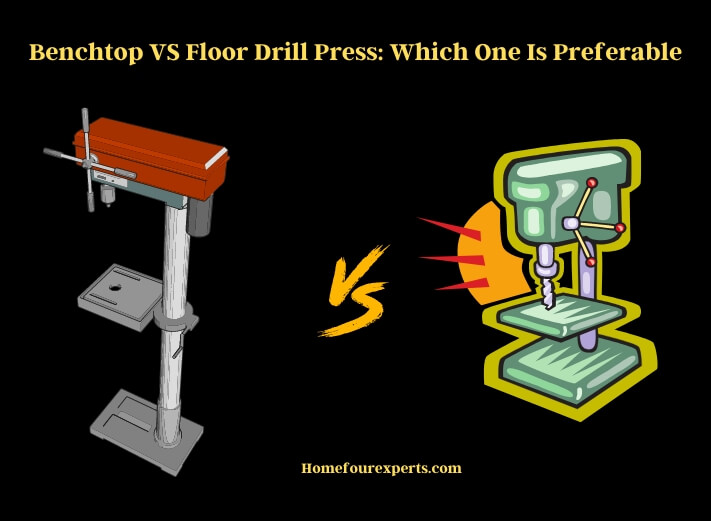Though tools are essential for our lives, every tool has advantages and limitations. Depending on them, you can use them for your work. Before using, you need to ensure what kind of job you are doing? Do you want to work for your hobby or profession?
If you are in a dilemma to choose between a benchtop and floor drill press, you need to consider some factors before choosing. There are so many differences between them. That’s why it would be helpful if you are reading benchtop vs. floor drill press.

Benchtop vs. Floor Drill Press:
To know the difference between benchtop and floor drill press, you need to learn their features with pros and cons. The difference is given below:
Size
The most crucial difference between a benchtop and a floor drill press is in size. The benchtop is small in size. So, it can easily fit on the top of the benchtop. The size varies from 9x13x20 inches to 17x23x51 inches. On the other hand, the floor drill press’s size differs from 18x29x68 inches to 29x41x93 inches.
Weight
As the floor drill press is big, it is heavier than the benchtop drill press. A benchtop is light in weight that one person can move easily. Sometimes, a benchtop is less than 100 pounds.
For the floor drill press, it is hard to move for one person. Sometimes, the floor drill press weight is 1000 pounds. That’s why for moving the floor drill press, you need heavy machinery.
Swing Size
Swing size is something that a drill can handle. As an example- if a drill press is 16-inches, then the swing size will be 16-inches. The head is 8-inches away from the frame and can cut 16 inches diameter material.
The swing size of a floor drill press is 33-inches, whereas the swing of a benchtop drill press varies from 6-inches to 18-inches.
Horsepower
Horsepower is a rating at which work is done. It is an output of an engine. Generally, tougher, thicker, and bigger material needs more horsepower. A benchtop drill press horsepower is less than 0.5, whereas the floor drill press is over 1 horsepower to 6 horsepower.
Voltage
For electric tools like a benchtop or floor drill press, voltage is an essential thing. At our house, we get 120 volts for everyday use. Generally, a benchtop drill press can operate at 120 volts. But a floor drill press needs 480 volts. That’s why to operate a floor drill press; you need a special power outlet.
Spindle Speed
Choosing a drill press spindle speed is one of the most important things. The benchtop drill press range is 400 to 4000 revolutions per minute. On the other hand, a floor drill press range is 40 to 5000 revolutions per minute. Depending on the material quality, you need to select spindle speed.
Spindle Tilt
If you need to cut any material at an angle, then the floor drill press can be a good choice. For a drill press manufacturer, spindle tilt causes more money and complex mechanisms. The benchtop has no spindle tilt option, whereas the floor drill press spindle can tilt up to 90 degrees.
Chuck Size
Using a cutting tool, you need to insert it into a part, which is called a chuck. According to the variation of chuck, you can vary the cutting tool. Though the chuck size is variable for both a benchtop and floor drill press, typically, the chucking size for a benchtop is less than 0.5 inches, and for the floor drill press, it is 5/8 inches.
Advantages and Disadvantages of Benchtop Drill Press:
There are some advantages and disadvantages of a benchtop drill press, which is given below:
Pros
For the alignment, the red and bright laser provides guidance;
The table platform of the benchtop provides easy operation.
Cons
It makes too much noise when operates;
Some models are good for wood, not for metal;
Driving a spindle will cause problems with drilling holes.
Advantages and Disadvantages of Floor Drill Press:
There are some advantages and disadvantages of a floor drill press, which is given below:
Pros
Suitable for heavy construction;
Without changing table position, you can work in deep reduction.
Cons
The difficulty of moving;
Adjustment of belt speed is difficult for beginners;
The difficulty of assembling.
Which One Is Preferable
According to the features and costing, there is a huge difference between the benchtop and floor drill press. If you can spend money and do woodwork as your hobby, then the floor drill press can be suitable for you.
If you do not have any high expectations or professional work, then the benchtop drill press is a good choice. On the other hand, if you have to do a lot of work with professional accuracy and a lot of space at your shop, you should choose a floor drill press.
Conclusion
According to the discussion, the significant difference is that one is attached to the workbench, and another one is stand by own. That’s why there are so many differences. These two tools are suitable for different usage. After learning the article, you can decide which one is needed for you.
Firstly, you need to keep in mind the safety factor. After ensuring safety purposes, you can work with the tools.
Read more:
- Plate Compactor VS. Jumping Jack: Which Should You Hire?
- How Do You Keep a Drill Press From Rusting
- Black Oxide Vs Titanium Vs Cobalt Drill Bits – Which one is Better?
About This Writer

Hello, I am David Rowan. I am a professional contractor with 10 years of experience in home building, different tools used, construction, home remodeling, and other home improvement work. I have already built many custom homes and continued to do several woodworking projects along with how to deal with all categories of tools.